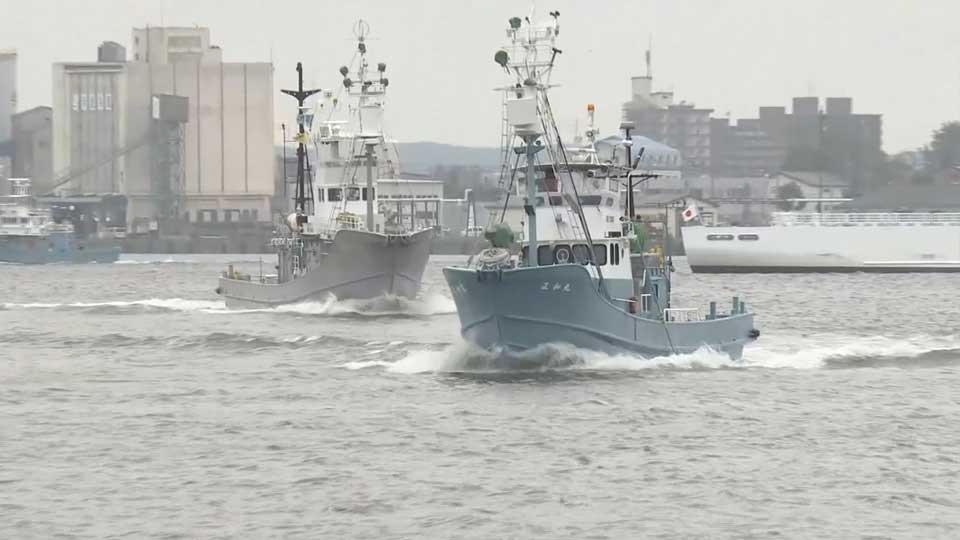The first day of the hunt

It's morning on July 1st and coastal whalers across Japan have gathered at Kushiro Port in the prefecture of Hokkaido.
"I'm very happy because all I know is whaling," said one.
The five fishing boats head out to sea, one after another. 7 hours later, one returns carrying a bounty of a 8.3 meter minke whale. It's the first whale to be caught since the resumption.
Dependent on research whaling
Until a week ago, the fishermen had been on one of the final government-funded research whaling expeditions. Trips like this used to make up a substantial portion of their income.
But the return of commercial whaling has changed things. The research trips are over and the fishermen are allowed to catch and sell whales themselves.
"We're a bit worried about how we'll have to adjust our business," says Yoshifumi Kai, leader of the Association for Community-Based Whaling. "But we're really happy that, after 31 years, commercial whaling will restart."
The whole picture
Commercial whaling will only be conducted within Japan's territorial waters and exclusive economic zone. Furthermore, the country has set a quota of 227 whales for the July-to-December period, based on an IWC-approved method. The numbers are set at 52 Minke, 150 Bryde's, and 25 Sei whales.
Japan says it caught 637 whales for research in 2018. Therefore, the new six-month quota translates to an annual reduction.
However, the fisheries ministry says it doesn't expect a major change in the amount of whale meat entering distribution channels for consumption as the biggest quota is for the relatively large Bryde's whale.

Why did Japan withdraw from the IWC?
The IWC has imposed a moratorium on commercial whaling since the 1980s and Japan switched to research whaling in accordance with this. But the practice was nonetheless widely criticized.
Many said Japan was using research as a cover for commercial whaling since the meat was sold on the domestic market anyway.
Japan proposed a resumption of commercial whaling to the IWC over 20 times but was denied on every occasion.
As a result, Japan decided to leave the body last year, convinced it was too strongly anti-whaling. Officials at the Fisheries Agency considered 48 of the 89 member nations to be ant-whaling at the time.

"Some countries focus only on the preservation of whales and there was no room for negotiation," said Chief Cabinet Secretary Yoshihide Suga. "And at September's general meeting, it became clear once again that the ideas of sustainable use of whale stocks and of conservation cannot co-exist."
The last chance for a fading industry

Despite Japan's repeated pushes for the resumption of commercial whaling, the country's appetite for the animal is small.
The average person in Japan consumes less than 40 grams of whale a year. For most, it's considered a delicacy.

A whale meat restaurant in Tokyo says about 80 percent of its guests are foreigners.
Chef Sumiko Koizumi says she wonders if the industry can survive after a 30-year hiatus.
"A lot of Japanese people completely forgot about whale meat. Unless we make a good impression on our consumers now, the industry may die."
Global criticism

Activists in London took to the streets to protest Japan's move. On June 29th, about 50 people marched toward the Japanese Embassy, carrying placards and chanting for whale protection.
"I don't understand why Japan is doing this," said Dominic Dyer, a wildlife advocate. "I think there is no major domestic market for whale meat."
Legal risks
Japan's concerns aren't limited to criticism from abroad. The country's former IWC chief negotiator says commercial whaling may violate the UN Convention on the Law of the Sea.
Article 65 of the treaty requires signatories to work with international organizations to conserve whales.

"That would be the point for those who wish to pursue a lawsuit against Japan," says Masayuki Komatsu, Senior Fellow at the Tokyo Foundation for Policy Research. "If Japan loses, that’ll have a detrimental effect on Japanese whaling. Japan loses the important foundation to practice whaling in the coastal and adjustment areas."
He says Japan should rejoin the IWC.
"The issue of protecting the marine ecosystem becomes bigger and bigger. Right now is the time for research, not commercial whaling."
It's clear that Japan's whaling tradition has entered a new phase. But it looks to be a difficult voyage to navigate."

